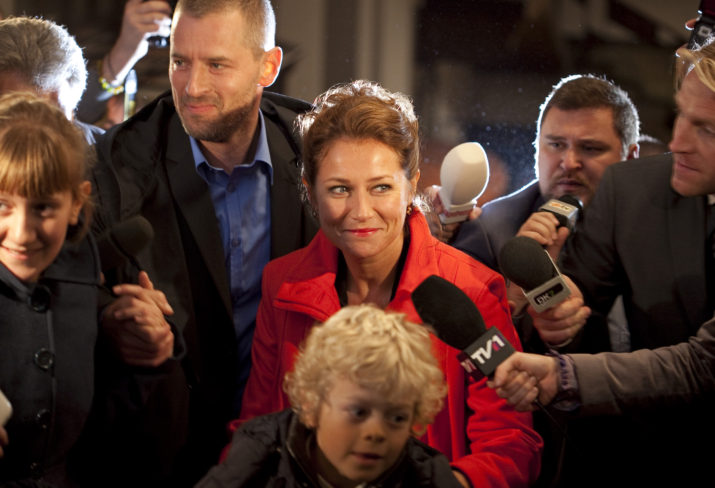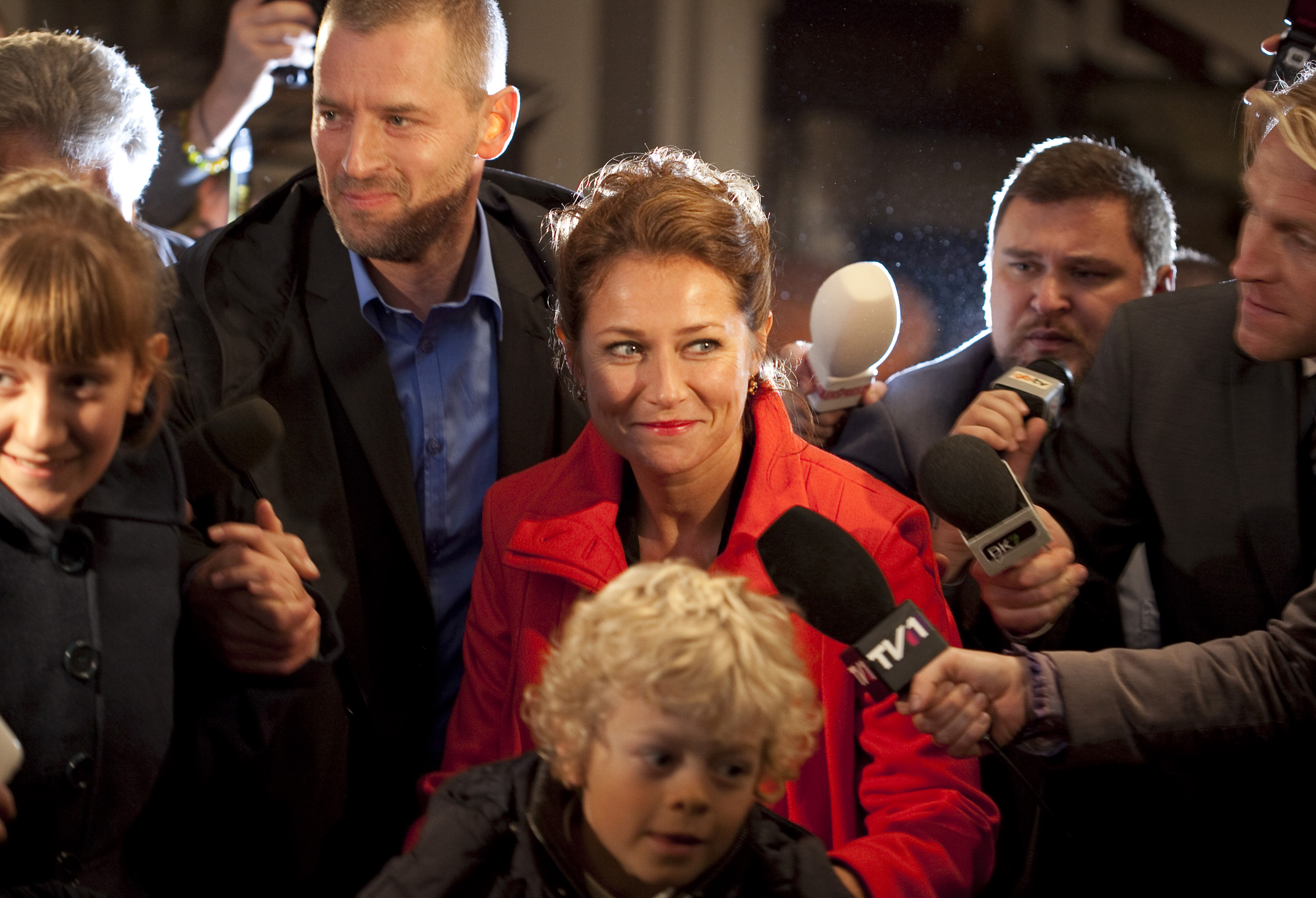

In the foreword of the thought-provoking volume Communicative Understandings of Women’s Leadership Development, Alice H. Eagly (2011) states that “there can be no genuine gender equality without women being represented equally with men in positions of power and authority” (p. ix). A celebrated Danish political TV drama Borgen (2010-2013, literally, Castle) does exactly that—puts a strong, intelligent, and visionary woman Birgitte Nyborg in the most powerful position of Prime Minister of Denmark and an inspiring role model for many women in Denmark, Europe at large, and beyond, considering the popularity of the series. The huge success of Borgen is comparable with the triumphant story of Birgitte Nyborg’s landslide victory in the Danish political election—in its overwhelming effect on the audience. The series became a hit in many European countries and later in the USA. John Powers, a reporter from the US National Public Radio claims that Borgen is Denmark’s West Wing (but even better) (NPR. February 4, 2014). Borgen harvested an impressive amount of international awards in various categories—ranging from Best Drama Series and specifically Best European Drama TV Series to the Outstanding Actress in the Drama Series by Sidse Babett Knudsen (better known to the audience as Birgitte Nyborg). Strong and smart, beautiful and sexy, with a tremendous sense of humor, flawless work ethics, and impressive endurance, leader of the Moderate Party Birgitte is also portrayed as a great loving mother and an adored wife—who initially seems to “have it all.” Until she becomes the Prime Minister—and the expected care for the country eventually clashes with the expected care for the family—reminding the audience of the unavoidable reality of female leadership—the infamous double bind.
As the story of Madame Minister unfolds in all its complexities, it eventually transforms into a cautionary tale for the emancipated and driven women, who witness in all three seasons how the combination of female political leadership and the ethics of domesticity and care become a quasi-oxymoronic concept
As the story of Madame Minister unfolds in all its complexities, it eventually transforms into a cautionary tale for the emancipated and driven women, who witness in all three seasons how the combination of female political leadership and the ethics of domesticity and care become a quasi-oxymoronic concept, and how the unobtainable ideal of “having it all” becomes strongly compromised, with the integrity and happiness of the women protagonist—if ever achieved—being fragmented and temporary at best. Having examined extensive media coverage throughout the political trajectories of Sarah Palin and Hillary Clinton, Tracey Quigley Holden and Sandra French (2011) suggest that “media savvy for women political candidates seems to require an uneasy truce between the polar opposites of the double binds” (190), referring to the complex relationship between the political and the personal of the female politicians. Alice Eagly (2011) clarifies: “Given common expectations that women should be nice and kind and that leaders should be assertive and dominant, women leaders face everyday challenges of finding a mix that blends niceness and assertiveness. The double bind is especially constraining when woman enter male-dominated leader roles because expectations have been shaped by the prior male occupants of these roles” (x). Birgitte Nyborg’ trajectory clearly follows suit—and the clash of the ”expected cares” results into a chain of personal losses, accompanying Madame Minister’s political victories, as if trying to discipline her ambition and punish her for her political success.
As the career of Birgitte Nyborg picks up, her family life starts to crack on multiple levels, her young son Magnus, trying to cope with the stressful environment of the constantly absent mother, starts to wet his pants. Nyborg’s loving and supportive husband Phillip–who previously even put his career on hold for the sake of Birgitte and the family—starts craving more intimacy, initiates an affair, and eventually files for a divorce, despite his wife’s desperate requests for the second chance. Within one year, Phillip starts a new, committed relationship with a childless Cecelie, who is willing to give him and his children her undivided attention and unconditional care: she plans their vacations, chooses decorations for their new house, actively engages with his children, they cook Mexican dinners and play family games together. A classic, almost stereotypical approach on famous Danish hygge. Cecelie empowers Phillip and repeatedly tells him that she loves him. Importantly, Cecelie happens to have a profession that embodies the ethics of traditional care per se—a pediatrician. In the meantime, emotionally wounded Prime Minster saves another political crisis, forms another Parliament, while secretly swallowing bitter tears of loneliness and disappointment, and being haunted by the media as the power-hungry bad wife and mother who sacrificed her family for her political career. Though originally German and still deeply ingrained in the German national psyche, the derogatory concept of a Rabenmutter (literally, the raven mother) —a mother who abandons her children and goes to work is a discursive framing—is used to discipline and shame many female leaders around Europe, including the character of Birgitte Nyborg.
Tracey Quigley Holden & Sandra French (2011) explain the complexity of the double bind of female political leadership as a direct consequence of the womb (aka woman) —brain (aka man) dichotomy, prevailing in public consciousness; and demonstrate how female political leaders often have to distance themselves from their families (especially children) to be taken seriously on the political arena. They specify that “for many women seeking leadership positions, this is the only means of transcending the womb/brain bind—effectively denying the role of mother or casting it firmly in the distant past” (188). Marginalization of women whose family has been in the epicenter of their lives is a well-known phenomenon. Faye Crosby et al. (2004) claim that discrimination is especially great against mothers, and suggest a self-explanatory metaphor of the maternal wall. Ironically, having successfully dismantled that maternal wall in her political career, Birgitte Nyborg eventually finds herself against the wall on the family front– facing the serious psychological and guilt-inducing illness of her daughter, made worse by the unbounded media attention. Under such circumstances, Madame Minister takes a radical and unprecedented step by going on temporary professional leave to divert the media attention from her daughter and help her recover. Curiously, it is during this period of Birgitte’s dedicated care of her family that her ex-husband’s attitude towards her changes from anger to admiration. Irony is not lost on the “Prime-Minister-on-hold,”who admits that indeed “[she] turned into Birgitte of [his] dreams.” And, following the conversation, Phillip breaks up with his partner Ceceile, and hurries to share the big news with his ex-wife… Such an ambiguous ending of Season Two leads the audience into believing that after Birgitte’s prioritizing her family, the two former spouses could rekindle their romance… Although the subsequent and final Season Three eventually puts an end to that wishful thinking by introducing Birgitte’s handsome, successful, and worldly British boyfriend; the timing of the flourished romance coincides with Birgitte’s two years off politics—the conscious choice of the former politician that magically transformed from a stressed and overworked political leader into a more beautiful, better dressed, relaxed professional woman, finally having time and desire to embrace romance and give and receive care. The relationship between the ethics of care on the professional and personal levels in Nyborg’s case seems to be of a clear “either”/ “or” nature. And indeed, when Nyborg eventually decides to re-enter Danish politics, she has to start from zero. Being no longer wanted by her own party, she decides to form a new one, and dives into the labyrinth of political power intrigues. Eventually, after a long and exhausting period of struggle, she becomes the new Danish Foreign Minister. Predictably, however, Birgitte’s private and family fronts have to take the hits: because of the financial constraints to form and support a new party, Nyborg moves outs of a luxurious apartment to a small and worn out place her children strongly dislike; starts spending less time with her children, and attempts to break up with her partner to dedicate all energy to her newly emerged political life. She also becomes diagnosed with precancerous cells in her breast, receives treatment, hides her disease as long as possible even from her family, and eventually experiences a crushing breakdown, which only slowly gives way to a gradual, long fought-for success. As if life is trying to teach her a lesson that her attempt of “having it all” is an attempt at reaching for the stars.
Alice Eagly and Linda Carli (2007) emphasize that the reasons gender equality has not been attained are multiple, and this complexity is one of the reasons that the metaphors of a labyrinth is more appropriate than a glass ceiling for representing women’s challenges in attaining positions with sustainable authority. The labyrinth of care with the ambition of ‘having it all,’ as in Birgitte Nyborg’s case, is the most challenging to navigate for the female politician in the walls of Borgen—the Danish power castle.
This is not to say that the challenge of the labyrinth of profound care for their private lives and their professional lives is relevant only to female politicians in the highest positions of power.
This is not to say that the challenge of the labyrinth of profound care for their private lives and their professional lives is relevant only to female politicians in the highest positions of power. The double bind does not surpass any of the professional women in the series, as we can see on the examples of two prominent journalists, Katrine Fonsmark and Hannah Holm. At age 31, Fonsmark—a successful anchor—fulfills her wish of becoming a mother, even though her decision is at odds with her partner, who eventually splits from his beloved, being “allergic to domestic bliss.” Overwhelmed with childcare and often seeking help from her criticizing mother, with a crushed self-esteem and growing commitment issues and insecurities, Katrine reminds us that she is also stuck in the infamous labyrinth, trying to navigate around the professional and personal hurdles, a situation familiar to many women in similar positions. The story of Hannah Holm – one of the strongest and the most uncompromising female characters in the series, and the best political analyst and investigative journalist in the country—serves as another cautionary tale for passionate, idealistic women professionals who fully commit to their careers like Hannah Holm. Holm’s 25-year-old estranged daughter would not even talk to her, having grudges against the “constantly absent mother,” a bitterly cynical and lonely woman. Despite her glowing career, Hannah is a chronical alcoholic, eventually admitting that “worse than having a bad family is having no family at all,” and implying the high price of her own choice, her wrong turn in the labyrinth.
The wise words of Marie Wilson from the White House Project suggest that “you cannot be what you cannot see.” The Danish television series Borgen invites us to see intelligent, driven, inspirational and very relatable women characters. Navigating through the labyrinth of challenges and choices, negotiating priorities, often neglecting themselves, and always compromising care, they share one striking similarity: that of being haunted by the social double bind. This is the price women pay for attempting to “have it all.”
Dr. Julia Khrebtan-Hörhager is Assistant Professor of Communication at Colorado State University, USA. Her research and teaching interest are in intercultural communication, transnational feminism, international film, and identity politics in Europe and the former Soviet Union. Dr. Khrebtan-Hörhager is a recipient of the 2016 and 2012 Top Paper Awards from the Intercultural Communication Division of the International Communication Association for her work on German-Italian multicultural relations.
Photo: Borgen, Mike Kollöffel, DR
References
Crosby, Faye J., Joan C. Williams, and Monica Biernat. “The maternal wall.” Journal of Social Issues 60, no. 4 (2004): 675-682.
Eagly, Alice Hendrickson, and Linda Lorene Carli. 2007. Through the Labyrinth: The Truth about how Women Become Leaders. Brighton, Massachusetts. Harvard Business Press.
Eagly, Alice H., 2011. “Foreword” in Elesha L. Ruminski & Annette M. Holba (Eds.) Communicative Understandings of Women’s Leadership Development: From Ceilings of Glass to Labyrinth Paths. Lanham, Maryland. Lexington Books, p. xi-xii.
Quigley Holden, Tracey and Sandra L. French. 2011. “Women in Politics: Leadership and Communication in the Campaign Trail” in Elesha L. Ruminski & Annette M. Holba (Eds.) Communicative Understandings of Women’s Leadership Development: From Ceilings of Glass to Labyrinth Paths. Lanham, Maryland. Lexington Books, p. 181-194.
Powers, John. 2014, February 4. “Borgen’ is Denmark’s ‘West Wing’ (But Even Better).” National Public Radio (NPR), retrieved from http://www.npr.org/2014/02/04/271525839/borgen-is-denmarks-west-wing-but-even-better, accessed on October 12, 2016.
Price, Adam, 2010-2013. Borgen Television Series Denmark: Camilla Hammerich.
Published on January 5, 2017.




